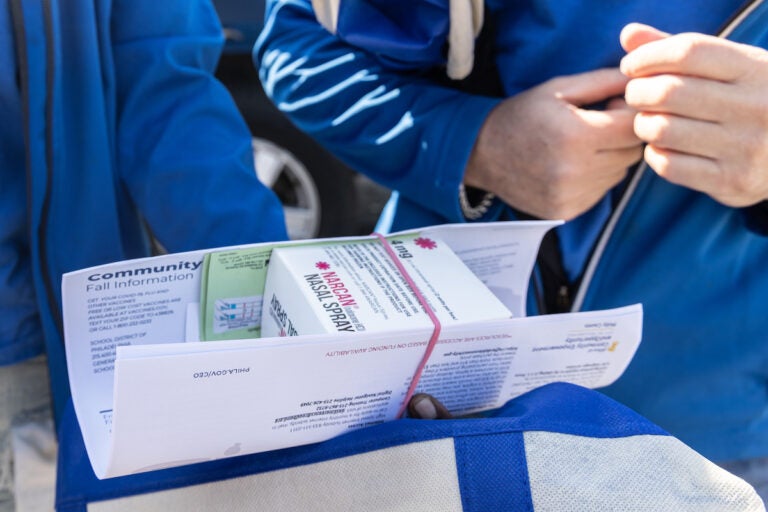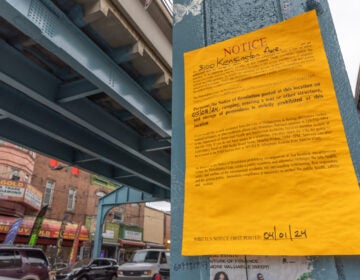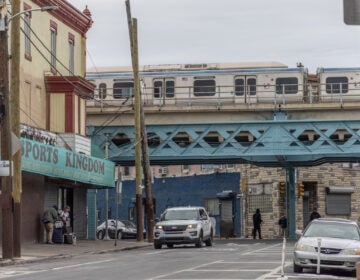‘A system of disjointed pieces’: Philly addiction medicine experts call for reforms in substance use treatment
Addiction medicine providers told members of Philadelphia City Council that addiction treatment options have not caught up to the complex needs of today.

FILE: An opioid crisis resource kit containing Narcan, fentanyl test strips and information on how to get addiction treatment and more harm reduction resources. (Kimberly Paynter/WHYY)
From Philly and the Pa. suburbs to South Jersey and Delaware, what would you like WHYY News to cover? Let us know!
A rapidly evolving street drug supply that continues to have a severe impact on people who use drugs and struggle with addiction is outpacing the capabilities of current addiction treatment programs and options in Philadelphia, local health experts say.
“Making it very difficult to provide comprehensive treatment within a system of disjointed pieces of medical, mental and substance use care,” said Dr. Lara Weinstein, addiction medicine specialist at Jefferson Health.
Local providers and researchers said if the city wants more people to succeed in substance use treatment and recovery, major changes need to be made by health organizations, hospitals and government agencies to ensure programs are capable of handling the severity and complexity of addiction treatment today.
“We can then finally improve quality of life of the entire community,” Weinstein said Thursday during a public hearing in Kensington.
City Council members of the Kensington Caucus heard from medical and behavioral experts from large health organizations and several city agencies about the barriers people face to getting into addiction treatment, including the availability of substance use treatment beds.
Experts who testified said their patients today are facing complex needs like addiction, homelessness, wounds and infections, psychiatric disorders and other social challenges.
But Dr. Christopher Martin, a psychiatrist at Jefferson Health, said there are only so many beds available across the city that can handle these high-level cases.
“What we have repeatedly found, clinically, is that our patients who require but cannot access this sort of multi-disciplinary care inevitably return to our care sicker and more complicated than before,” Martin said. “This is simply not sustainable for our patients or for our health care systems.”
There’s also a mismatch between the kind of treatment options available to people and their actual needs, said Dr. Margaret Lowenstein, an addiction medicine provider at Penn Medicine.
“Patients seeking substance use treatment who also have infections or wounds struggle to get into a rehab that has the capacity to care for these issues,” she said. “Patients who need nursing care after hospitalization can’t always continue to receive substance use treatment in those facilities. For example, many nursing homes will not accept patients on methadone.”
And when someone does decide to seek treatment for substance use, Jefferson Health research assistant professor Megan Reed said people can end up waiting a long time at city assessment centers — sometimes up to 16 hours — before they get placed into a program or bed.
“This would be arduous for anyone, but for someone going through withdrawal, it is typically intolerable,” Reed said.
Experts say withdrawal for people using fentanyl, a powerful synthetic opioid, can be particularly painful and harsh, which is why current addiction medicine providers recommend that people get rapid access to medications like methadone and buprenorphine to help ease symptoms.
“We’re setting patients up to fail if we’re not providing this care,” Lowenstein said.
One solution City Council members and public health providers have proposed is to create a centralized dashboard with real-time information about treatment bed types and availability.
“[It] will allow people to just go into that site and figure out where’s the next bed, regardless of what the definition of that bed is and who the provider is,” said 7th District Councilmember Quetcy Lozada. “We want to respond to the person’s need immediately.”
Addiction medicine providers said bigger investments in wrap-around services like housing and transportation will also be crucial for people working to maintain their substance use treatment and recovery for the long-term.
“We also need to remember addiction is a chronic condition that persists long after an individual completes their stay in a rehab facility,” Lowenstein said.

Get daily updates from WHYY News!
WHYY is your source for fact-based, in-depth journalism and information. As a nonprofit organization, we rely on financial support from readers like you. Please give today.





